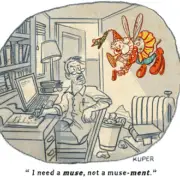As Your Fiction Workshop Instructor, I Don’t Want to Read Anything Less Than Beautiful—Or About Boats
Dear New Fiction Writers,
Thank you for enrolling in my fiction workshop; before we start this semester, I’d like to set some ground rules for workshopping pieces. I expect all of your work to be beautiful renditions of your interior lives. Every story must reflect all of the knowledge this world has imparted to you. While reading your classmate’s work, I expect generosity, engagement with a piece’s project, and no mention of how a boat or a ship would round out the explored metaphors. This will help us to have a productive and constructive writing environment with no seafaring adventures or deck-side existential quandaries on the Congo.
When critiquing a peer’s writing, try to sandwich any criticisms between positive notes. For example, I could tell a writer, “Your attention to detail was exquisite and didn’t rely on any ship similes. But I did feel your insertion of a docked boat trite and unnecessary. However, your description of the female protagonist didn’t deliquesce into comparisons between her temperament and the tempestuous ocean—I appreciated this.”
You may be tempted to allude to a ship’s voyage a la Dracula through newspaper articles or the vessel’s log book; do not give into this temptation. Although channeling your inner Captain Picard and penning a captain’s log seems like an enticing prospect, refrain. Which reminds me, spacecraft is included under the umbrella of “ships”; they are the boats on the galactic ocean, after all. See what I mean? Terrible metaphor; lazy writing—no ships.
I understand our literary history is ripe with amazing stories set on boats—Melville’s Benito Cereno guaranteed every bro-film would misinterpret the iconic shaving scene and reenact it in a backwards role-reversal. An old man’s Christ-like trials to catch a large marlin shaped many a high schooler’s vision of what literature should be: short, pithy sentences and the sea’s unforgiving hand, disdainful for Man and his sea-traversing steed. Daniel Defoe wrote of a shipwreck and pirates, respectively, in his first two books and taught us the dangerous lure of capitalism and the pitfalls of solitude, which everyone promptly ignored because “BOATS!” But I digress.
“But what if it starts on a boat, but then the protagonist ends up on an island?” you may ask. To which I respond, “Didn’t I cover that with Defoe? You’re thinking of H.G. Wells, aren’t you, you obstinate monster? Or Charles Dickens’ seldom-discussed shipwrecked narratives, I bet, you contrarian beast? Did I stutter? No. Boats.”
In conclusion, I look forward to reading all of your beautiful, thoughtfully crafted stories this semester. A piece of advice: avoid all boat rides or travels by ferry lest inspiration strike and you feel compelled to lay down pages about sea travel or the changing tides of your protagonist’s fortunes. I’ll see you all next week.
Best,
Ishmael












